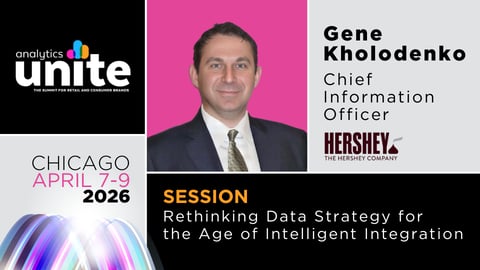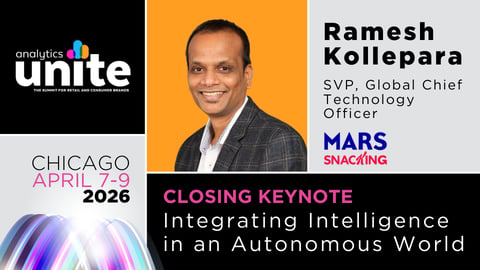Materne and Yesway Leverage Data to Predict Customer Needs and Deliver End-To-End Personalized Experiences
How can companies better leverage data to deliver personalized consumer experiences?
According to Darrin Samaha, VP of marketing at Yesway, automation is a key focus area, and we’re only just now starting to scratch the surface of what it can do in terms of influencing CX.
“When you look at things we’re able to do today that we weren't able to do even three years ago, it’s incredible,” he stated in a recent discussion at Analytics Unite. “What will we be able to do three years from now?”
Samaha was joined by Mark Edmonson, chief marketing officer, Materne North America, and Andy Walter, strategic advisor, P&G (retired), who moderated the conversation.
- More From Analytics Unite: Kellogg Unlocks Power of Cross-Domain Data in the New Analytics Economy
Data needs to be part of the learning curve, so what about personal examples of disappointing retail or online experiences?
Edmonson recalled the over-use of QR codes in the early 2000s which would simply send customers to a product website.
“Who would have thought it would take a pandemic to change that? Now QR codes deliver more useful information as consumers adapt to that technology,” he said.
Samaha, meanwhile, shared an experience of an order gone wrong at Chipotle when the chain restaurant’s app didn’t accurately reflect a particular store’s capabilities. He recalled how the store manager personally made the experience right, compelling Samaha to reach out to Chipotle corporate to praise their customer service.
- Growing Personalization By Growing Loyalty
Loyalty efforts are playing a significant role in informing business practices and allowing enterprises to leverage personalization. These efforts, however, require investment to grow, and there’s a lot of competition going around.
Samaha touched on the “Yesway Rewards Program,” which launched in 2016 and rolled out to its sister brand Allsup’s. After refocusing the program to adapt to pandemic demands, the company realized it needed to change loyalty partners in order to grow.
“We’re probably mid-point in our journey right now. We’re not as sophisticated yet as some of the other retailers in this room, but we’re a bit ahead of the curve in our channel. When we evaluated our program over the last ten months, we recognized that during COVID, a lot of competitors accelerated their investment in tech and in loyalty programs, integrating all those points like online ordering, delivery, and creating better customer experiences,” said Samaha.
When it comes to design, Samaha said they’ve flipped the script at Yesway and are thinking less about what they can do within the app and are focused instead on measuring loyalty programs through business outcomes, like wallet share, for example.
When asked what’s on his wish list, Samaha stated, “More experiential rewards, things beyond a simple product that can help to create a personalized, differentiated program.”
Interested in More Convenience and Grocery Efforts?
The inaugural GroceryTech event, produced by Progressive Grocer and RIS News, brings together the combined community of business and technology grocery executives on the journey to modernize their technology infrastructure to support innovation — to help grocers replicate the “small neighborhood grocery store on the corner” concept, while still operating profitably at scale.
Learn more.
The Data Journey Is a Winding Road
Materne North America is at the beginning of its data journey and Edmonson is in the process of identifying the problem statements.
“What are the key areas where we can identify where technology is challenged? We’re looking for a partner who can help us forecast better, but who can also work within our total ecosystem and all the other technologies that we have,” he explained. “Right now, my pain is a 10, my point on the journey is a one.”
The company is focused on “letting experts be experts,” with regard to data collection, relying on external help while they staff up internally.
Investing in technology is a priority for both brands, in good times and in bad. Edmonson shared his “technology-first” philosophy saying, “I know I’ll get a better return on investment if I can actually identify the right tools that allow me to understand audiences better, and know who’s loyal and who’s not.”
As an example, he pointed to the amount of promotion GoGo squeeZ was doing as a brand pre-COVID, with $2-3 dollars off, and the amount of buyer fall-out they have seen post-COVID.
“We spent so much money buying those shoppers versus identifying those consumers who are truly the right people for our brand,” said Edmonson. “Investment in the right technology to get the right consumers to opt into our brand is more important than spending on advertising.”
Similarly, Samaha explained that Yesway is leveraging its vendor relationships and in-house first-party data to improve performance in categories like tobacco, energy drinks, and beer and liquor. Samaha has found that Yesway’s retail partners are “betting big on first-party data.”
“The more we share, the more we get, and that’s the win-win we’ve been talking about in other sessions,” said Samaha.
Edmonson agreed and shared a similar experience of double-digit brand growth after combining first-party data with a retailer’s data to create a customized marketing plan that targeted a specific consumer.
Edmonson described a comprehensive mar-tech master dashboard that allows for autonomous orchestration throughout the enterprise, and “lets you see the whole story, end-to-end.”





